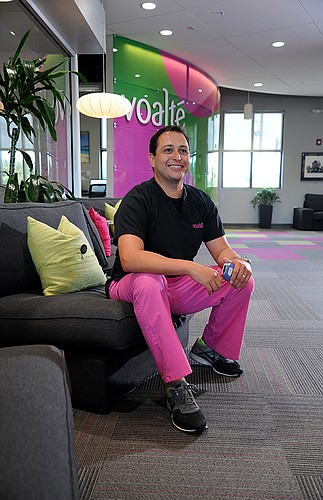- November 24, 2024
-
-
Loading

Loading

There are several signs that Voalte, which develops smartphone apps that allow hospital employees to communicate with each other, isn't a baby anymore.
A big one: It no longer touts every single contract with a press release and social media blitz.
To CEO Trey Lauderdale, those are the victories the company should be claiming regularly, so there's no reason to brag. It's an act-like-you've-been-there before mentality that befits an industry leader, not a startup. Sarasota-based Voalte, says Lauderdale, is decidedly the former.
“A few years ago people didn't take us seriously,” says Lauderdale. “But now we are the undisputed leader in smartphone person-to-person communication in health care.”
Adds Lauderdale: “We definitely have a target on our back.”
Voalte officials stopped publicly disclosing revenue figures in 2012, when the company had about $10 million a year in sales. But growth has come quickly. The company, for example, had a three-year compound annual growth rate of 84.17% from 2011 to 2014, according to the 2015 Gator100. The Gator100 is a list of the fastest-growing companies run by University of Florida alumni and Voalte was 15th on the list.
The current year has been a watershed for Voalte in several ways, and not only because now it's an industry leader. New clients include Beth Israel Deaconess Hospital in Massachusetts and UCSF Medical Center at Mission Bay in San Francisco, a state-of-the-art medical complex that covers two blocks and cost $1.5 billion to build.
But Voalte also suffered a setback in February when it laid off about 30 employees. Lauderdale says the job cuts were mostly a matter of poor timing and a restructuring of some roles. “We probably hired people ahead of when we should have,” Lauderdale says. “As a leader it kills me that we made that mistake.”
Lauderdale says the company is back up to about 125 employees, right around where it was before the cuts. The employees the firm now has, he adds, are more honed for specific tasks than before, another sign of company maturity. “We are very much in a scaling and growing mode,” says Lauderdale. “Most of our competitors are still trying to get a product out the door.”
Another notable victory came in April, when Voalte raised $10 million in equity funding from undisclosed entities in the health IT and health care industry. The company, according to the public filings on the investment, says it plans to raise another $7 million. That effort is in addition to a $36 million investment the company picked up in early 2014 from White Plains, N.Y.-based Bedford Funding.
Voalte stands for voice, alarm and text. Its technology works on both iPhone and Android systems, and at least 50,000 caregivers use Voalte's products and technology every day, the company says. That's up from about 35,000 in 2014.
Several challenges cloud the second half of the year for Voalte. One is getting young employees to move to the area. “People want to work from Denver or San Francisco or Houston,” he says. “Anywhere where there is more young people.”
Another obstacle is to balance work with current clients against the chase for new customers and technology. “We can't be a one-hit wonder,” says Lauderdale. “We don't want to be a single-product company. We want to light a fire that will change the industry.”
Coming to Town
Voalte CEO Trey Lauderdale believes the Sarasota-Bradenton region can become a national hub in mobile health, which could be a $26 billion industry by 2018, according to MobiHealthNews. One step toward that goal is an industry user conference Sarasota-based Voalte plans to host in November.
The firm, which uses smartphone apps to help hospital employees communicate, expects up to 100 attendees for the event that will showcase Voalte products and services, in addition to the local area. Many attendees will be C-level hospital and health care executives. “It's part of our vision of branding Sarasota as a mobile health community,” Lauderdale says. “We are really excited about it.”
Follow Mark Gordon on Twitter @markigordon